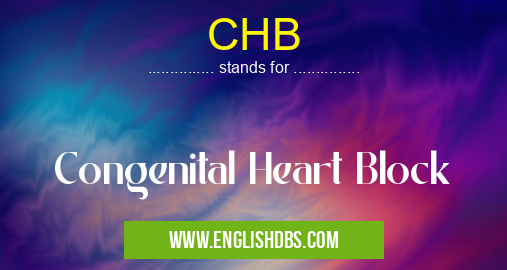What does CHB mean in CARDIOLOGY
CHB (Congenital Heart Block) refers to a condition where the electrical impulses that regulate the heart's beating are obstructed, leading to an abnormally slow heart rate. This blockage occurs within the heart's electrical conduction system, specifically at the atrioventricular (AV) node, which normally transmits electrical signals from the atria (upper heart chambers) to the ventricles (lower heart chambers).

CHB meaning in Cardiology in Medical
CHB mostly used in an acronym Cardiology in Category Medical that means Congenital Heart Block
Shorthand: CHB,
Full Form: Congenital Heart Block
For more information of "Congenital Heart Block", see the section below.
» Medical » Cardiology
Causes
CHB can be caused by various factors during fetal development, including:
- Genetic abnormalities
- Maternal autoimmune diseases
- Certain medications taken during pregnancy
- Congenital infections
Symptoms
The symptoms of CHB can vary depending on the severity of the blockage:
- Slow heart rate (bradycardia)
- Fatigue
- Dizziness
- Shortness of breath
- Chest pain
- Fainting spells (syncope)
Diagnosis
CHB can be diagnosed through various tests:
- Electrocardiogram (ECG): Records the heart's electrical activity, revealing the characteristic slow heart rate and AV conduction delay
- Echocardiogram: Uses ultrasound to visualize the heart's structure and function, assessing for any underlying heart defects
- Fetal echocardiography: Performed during pregnancy to detect CHB in the developing fetus
Treatment
The treatment for CHB depends on the severity of the condition:
- Mild CHB: May not require treatment, but regular monitoring is recommended
- Moderate or Severe CHB: May require pacemaker implantation, a device that generates electrical impulses to regulate the heart rate
Essential Questions and Answers on Congenital Heart Block in "MEDICAL»CARDIOLOGY"
What is Congenital Heart Block (CHB)?
CHB is a condition where the electrical impulses from the upper chambers of the heart (the atria) are blocked from reaching the lower chambers (the ventricles). This results in a slower heart rate, which can be life-threatening if it becomes too slow.
What are the symptoms of CHB?
Symptoms of CHB can include:
- Slow heart rate (bradycardia)
- Dizziness or fainting
- Shortness of breath
- Chest pain
- Fatigue
- Enlarged heart
- Sudden cardiac arrest
What causes CHB?
CHB can be caused by:
- Genetic defects
- Autoimmune diseases
- Infections
- Certain medications
- Maternal lupus
How is CHB diagnosed?
CHB is diagnosed through an electrocardiogram (ECG), which measures the electrical activity of the heart.
How is CHB treated?
Treatment for CHB depends on the severity of the condition. Options include:
- Medications to increase heart rate
- Pacemaker implantation
- Surgery
Final Words: CHB is a congenital heart condition characterized by a blockage in the heart's electrical conduction system, resulting in an abnormally slow heart rate. The causes and symptoms can vary, and the diagnosis and treatment are tailored to the severity of the condition. Regular monitoring and proper management are crucial to ensure optimal heart function and prevent potential complications.
CHB also stands for: |
|
| All stands for CHB |
